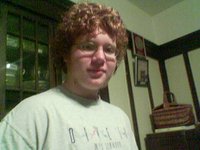The following is a work of fiction. Here is the Table of Contents, which is updated as new chapters are written.
It is the third in a series of sci-fi novels of the type known as
alternate history. What’s different is that this series takes place in
our time, with characters familiar in your real life.
The first book in the series, The Chinese Century, was written late 2004. Its table of contents is here. The second, The American Diaspora, was written in 2005. The table of contents for that book is here.
The Sun beat down on Johannesburg, and from my vantage point near the Airport I could see the whole city.
The Always-On factory sat securely near the Airport, making its roof the perfect place from which to launch our experiment. The new managers of the company had done a great favor in renting out the space to their co-founder.
Now the roof held a line of greenhouses, their aluminum bases lashed to the roof, plastic poles acting as a skeleton, covered in plastic sheeting. Each greenhouse was growing a different local plant, chosen for its heat tolerance and the speed with which it grew. Fans spun on each end of every greenhouse, one blowing air in, the other pulling it out. The seeds had been lain in aluminum troughs, the troughs filled with water rich in fertilizer, and of course the roots.
Between each greenhouse stood a row of solar panels. Just as a different plant was in each greenhouse, so a different type of solar panel lay between each. The solar panels powered the fans, as well as pumps sending the water through the root systems. Any excess power they generated was measured, then run by wire to a room inside the building, where an electrolysis rig turned it into hydrogen.
Branson wanted action, and this was action. Just a few weeks after he got the bug up his butt about renewable energy, we were getting data on the most efficient way to use the Sun.
I was taking no credit for any of this, except perhaps genetic. The man behind it all stood next to me and beemed. My 16 year old son John, and the high school science club he belonged to, were the brains and muscle behind all of this. We would pay them all for their time, and put their names on any paper that resulted.
Since most were not as financially fortunate as John was, it was a very good gig. Some of his classmates said they were now making more money than their parents. I found this hard to believe, but John had been to their homes, and he believed it.
Along with water, energy, and biomass, time was another factor to consider in our experiment, so John and his cohorts wore pedometers at their waists when they came up here. The pedometers measured both the time they spent working and the amount of walking they had to do as part of the job. They were encouraged to keep well-hydrated but when they needed some Gatorade this, too, was measured, as part of the experiment.
"Very elegant. Didn’t know you had it in you."
John didn’t answer, but I could see the hint of a smile. He was nearly as tall as I am, now, 6 feet of muscle with curly red hair. The move to Africa had hit him hard – his previous life had been a simple one of books, video games and TV. Now he worked 16 hour days – doublt-shifts of high school in the Tower three days per week, two full days down here. Friends named Fariq and Sam, one an Indian and the other Xhosa, also supervised the rig two days each, and on the seventh day everything was deliberately left on auto-pilot.
John’s sister Robin worked hard as an animal advocate, and her mom worked hard as a credit card executive. I felt like the slacker in the family, even though it was my picture that usually appeared in the local paper, even on the TV. I had started here as a blogger for Virgin-Maverick, but now that its Twin Towers were a dominant reality on the skyline, I was often called upon to act as a company spokesman when the real executives were out of town or busy. The media liked to tell the story of Always-On, and frequently labeled me (when they were feeling friendly) as "local entrepreneur." When they weren’t the line was "Branson spokesman."
I wondered what label they’d use after they got a load of this rig. And the numbers it would deliver, just a few weeks from now.










